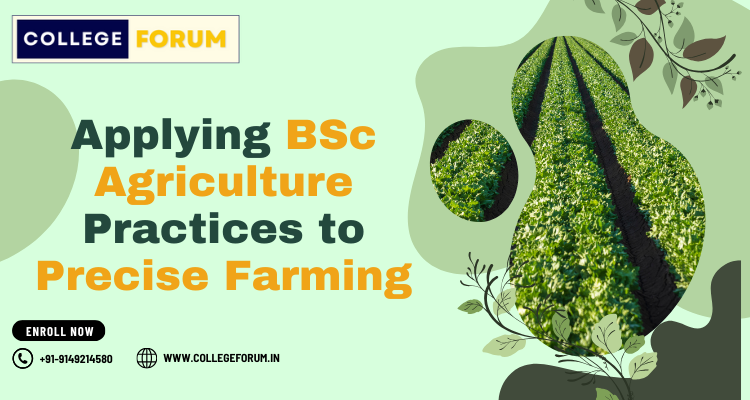About Agriculture
In the ever-evolving landscape of agriculture, the integration of cutting-edge technologies has given rise to a paradigm shift known as Precision Agriculture. This transformative approach, grounded in data-driven decision-making and advanced technologies, is reshaping the way agriculture is practiced and taught within Bachelor of Science (BSc) Agriculture programs. This article explores the profound impact of Precision Agriculture on BSc Agriculture practices and how it is revolutionizing the future of farming.
Understanding Precision Agriculture:
Precision Agriculture, often referred to as precision farming or smart farming, involves the use of technology to optimize various aspects of farming with unprecedented accuracy. This approach relies on real-time data, sensors, and advanced analytics to make precise decisions regarding crop management, resource allocation, and overall farm operations. BSc Agriculture programs are at the forefront of imparting knowledge about these technologies to the next generation of agricultural professionals.
Data-Driven Decision-Making:
At the core of Precision Agriculture is the utilization of data to inform decisions. BSc Agriculture students are now learning to leverage technologies such as satellite imagery, sensors, and drones to collect data on soil conditions, crop health, and weather patterns. This data is then analyzed to make informed decisions about irrigation, fertilization, and pest control. The result is a more efficient use of resources and enhanced productivity.
Variable Rate Technology (VRT):
Precision Agriculture introduces BSc Agriculture students to Variable Rate Technology, a game-changer in optimizing input use. Instead of applying a uniform rate of inputs across the entire field, VRT enables the application of inputs—such as fertilizers or pesticides—at variable rates based on the specific needs of different areas within the field. This targeted approach minimizes waste and environmental impact while maximizing yields.
Precision Planting and Seeding:
In BSc Agriculture programs, students delve into the intricacies of precision planting and seeding. Technologies like GPS-guided planters and seeders ensure that seeds are planted at optimal spacing and depth, contributing to uniform crop emergence and, ultimately, higher yields. This level of precision in planting is a key factor in achieving consistent and efficient crop growth.
Remote Sensing and Imagery:
Satellite and drone imagery are valuable tools in Precision Agriculture, providing BSc Agriculture students with a bird’s-eye view of their fields. These technologies allow for the early detection of crop stress, disease outbreaks, or nutrient deficiencies. Armed with this information, farmers can take proactive measures to address issues before they significantly impact crop yields.
Smart Irrigation Systems:
Water management is a critical aspect of agriculture, and Precision Agriculture introduces BSc students to smart irrigation systems. These systems use real-time data on soil moisture levels and weather conditions to optimize irrigation schedules. This not only conserves water but also ensures that crops receive the precise amount needed for optimal growth.
Challenges and Opportunities:
While Precision Agriculture offers immense potential, BSc Agriculture programs also address the challenges associated with its implementation. Issues such as the initial cost of technology adoption, data privacy concerns, and the need for specialized skills are discussed. BSc students are taught to navigate these challenges and recognize the long-term benefits of embracing Precision Agriculture practices.
The Future of BSc Agriculture:
As Precision Agriculture continues to evolve, BSc Agriculture graduates are poised to become leaders in sustainable and efficient farming practices. The integration of technology in agriculture not only enhances productivity but also contributes to environmental sustainability by reducing the environmental impact of farming activities.
Conclusion:
Precision Agriculture is a transformative force in modern agriculture, and its integration into BSc Agriculture programs signifies a forward-looking approach to education. BSc Agriculture graduates equipped with knowledge in Precision Agriculture are not only prepared for the current demands of the agricultural industry but are also positioned to drive innovation and sustainability in the future of farming. The fusion of traditional agricultural practices with cutting-edge technologies is shaping a new era in agriculture, and BSc Agriculture programs are at the forefront of this revolution.







